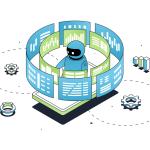The Power Of CRM Platforms: Make Customers Think You’re A Mind Reader



“How nice!” “Why, thank you!” “How did you know?” There are all kinds of ways customers respond when you seem to anticipate their needs or provide some value they didn’t expect, but that third one is probably what we should focus on in this post. The fact is, customers are usually surprised and

“How nice!”
“Why, thank you!”
“How did you know?”
There are all kinds of ways customers respond when you seem to anticipate their needs or provide some value they didn’t expect, but that third one is probably what we should focus on in this post.
The fact is, customers are usually surprised and delighted when companies are proactive because they’re used to the opposite experience.
They’re used to running into a problem, or needing to buy something, and reaching out to companies where they have to offer a lengthy explanation of what they want.
Even worse, they might have to go through the same spiel multiple times if the first contact at the company they reach isn’t sure of how to respond.
Companies can also miss the mark when it comes time to follow through on what they have promised.
A shipment never seems to arrive.
A sales rep doesn’t remind them when their contract is up for renewal.
An urgently-asked question remains unanswered.
When a company is not only diligent enough to deliver on expectations but exceeds them by being proactive, therefore, customers are understandably shocked.
The shock may be even greater when the company that’s being proactive is a small or medium-sized business (SMB). The assumption is that SMBs are too busy, too under-resourced or over-extended to go above and beyond. Only a large enterprise would have enough people or tools to know what a customer will want or need ahead of time, right?
When SMBs use a CRM, however, they get as close to becoming fortune tellers as they possibly can.
Unlike a crystal ball, though, a CRM uses the constant input of data to study and learn about your customer base as a whole, and also individual customers.
You’re not really going to read anyone’s mind, but if you use a CRM to its full potential you might manage the equivalent of finishing your spouse or best friend’s sentences.
To be more specific, customers may think you’re a mind reader when:
1. You find the perfect add-on to what they’ve already purchased
Sometimes a customer will make an initial purchase and not realize they’ll need some kind of accessory to get the most out of their investment. A rep might suggest it at the time, but they demur — and then forget. A CRM can help remind you of the things a customer would like to be reminded of themselves.
In other cases, CRM can help you look at purchase patterns within your larger customer base to see what might follow on in terms of other needs your customer may encounter. Then it becomes easy to recommend a new item that is welcomed with open arms. You’ll not only be a more productive seller, but also a more effective one.
2. You bring forward an upgrade or replacement before it becomes urgent
Customers may buy products that tend to wear out in a fairly predictable cycle. Or there might be circumstances where a product is no longer compatible with other items they own. Worst of all, perhaps, is when a product has to be recalled for some reason.
Instead of putting the burden on customers to deal with those things after they happen, SMBs can tap into their CRM to see when upgrades or replacements are likely required. When you reach out to let them know, customers can only conclude you’ve truly got their interests at heart and have been actively thinking about them, even when the customer hasn’t been in touch for a long while.
3. You deliver value in the form of ideas, strategies or inspiration
The more practice you get at selling, the more you’ll begin to realize that customers put a premium on those with expertise, not just a great line or products. They want people who can give good advice, drawing upon the experience of other customers like them.
CRMs are essentially repositories of such expertise, and can offer opportunities to accelerate the time it takes to close the next deal with a customer. You may learn, for instance, that customers tend to purchase a particular item after you’ve shown them a market research report or video that helps them make the business case.
You can offer that kind of content to other customers even earlier — before they ever conceive of buying their next product —and suddenly they feel you know their interests like the back of your hand.
4. You follow up before you’re even asked anything
Once they complete a purchase, customers are often quick to walk away, and most companies do little to detain them. A great company, however, may offer some truly helpful parting words.
Your CRM data may tell you, for example, what questions customers commonly ask once they get started using their new product, or even the areas where they tend to call into the customer service team for troubleshooting. You can save them that time and trouble by offering customer service in reverse — even if it’s just a few rules of thumb or best practices they don’t know they need yet.
5. You recognize them no matter where or how they reach you
Companies may work with large numbers of customers, but that doesn’t mean anyone who made a purchase should feel like a stranger the next time they show interest in a product.
SMBs can seem much larger and more sophisticated than customers expect simply by demonstrating a good memory. A CRM means multiple members of your team will be able to pull up everything they need to know about your firm’s history with a customer, whether they reach out by phone, email or some other channel. It’s not exactly the same as how human memory works, but it helps develop a sort of institutional memory that all employees can draw upon.
A great relationship is always built upon strong communication, but that’s not the only critical piece.
There’s a lot to be said for also being considerate — for showing customers that you’re working in their best interests, whether they’re directly engaged with you at the moment or not. Even if they don’t actually think of you as a mindreader, using a CRM to be more considerate will make customers more loyal, because you’re proving that their wants and needs are always top of mind.





















